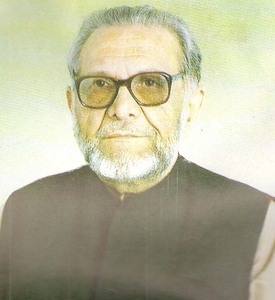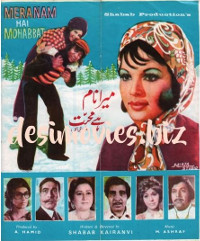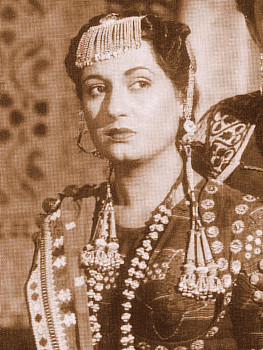Related Research Articles

Ahmad Nadeem Qasmi born Ahmad Shah Awan was an Urdu language Pakistani poet, journalist, literary critic, dramatist and short story author.

Ashfaq Ahmed was a Pakistani writer, playwright and broadcaster. His works in Urdu included novels, short stories and plays for television and radio of Pakistan. He received the President's Pride of Performance and Sitara-i-Imtiaz awards for his everlasting services in the field of broadcasting and literary heritage of Pakistan.
Ghulam Mohiuddin ; also spelled Ghulam Mohi-Ud-Din) is a Pakistani actor of Urdu and Punjabi films.

Hussain Ahmad Madani was an Indian Islamic scholar, serving as the principal of Darul Uloom Deoband. He was among the first recipients of the civilian honour of Padma Bhushan in 1954.
Shaheen Bano, known professionally as Zeba, is a Pakistani actress. She was one of the top stars of the Pakistani film industry in the 1960s and the early 1970s.
Muzaffar Adeeb, known mononymously as Adeeb, was a Pakistani film actor. He appeared in 38 Indian films from 1940 to 1962, although he did not start performing in films very actively until the 1950s. In 1962, he shifted from Bombay, India, to Lahore, Pakistan and resumed his film career that lasted until his death with over 500 films to his credit.

Amit Kumar is an playback singer, actor, music composer. Kumar launched his own music production company, named Kumar Brothers Music. He predominantly worked in Bollywood and regional film songs since the 1970s, including 150 Hindi and Bengali compositions by R. D. Burman. After Burman's death in 1994, citing a lack of quality music composition, Kumar withdrew from playback singing and concentrated on live orchestra shows. In addition to singing in Hindi, has also performed in Bengali, Bhojpuri, Odia, Assamese, Marathi and Konkani. He is the eldest son of singer-actor Kishore Kumar.
Nazim Panipati was a film song lyricist and a film script writer in the Indian and Pakistani film Industries during the 1940s and 1950s.
Neelo Begum was a Pakistani veteran film actress. She made her film debut in 1956 with Hollywood film Bhowani Junction. She was known as The Queen of Romance and The Princess of Romance for her portrayal of romantic roles. She worked in more than 134 Pakistani films including Urdu and Punjabi language films.

Raja Mehdi Ali Khan was an Indian poet, writer and a lyricist.

Mere Naam Hai Mohabaat is a 1975 Pakistani romantic drama film. The film's story is inspired by Love Story (1970), which in turn was based on the novel of the same name by Eric Segal. It won the Nigar Award in 1975 for Best Film of the Year, with additional six awards in different categories. The film was also released in China and became successful there.
Ghulam-Us-Saqlain Naqvi, was a Pakistani Urdu novelist and travel writer. was a Pakistani Urdu writer, best known for his short stories. His work often portrayed rural life.

Subh-e-Pakistan is a Pakistani live morning show hosted by a research scholar Aamir Liaquat Hussain. It was first aired 19 November 2014 on Geo Entertainment. The show is preceded by morning show Utho Jago Pakistan, hosted by Shaista Wahidi which was banned due to act of blasphemy during the show. After being defunct for few months, the show was re-launched on 7 December 2015, under the title Subh-e-Pakistan Kahani Ke Sath on channel Geo Kahani. On May 23, 2020, Aamir Liaquat Hussain announced that the morning show Subh e Pakistan will be coming back to Express Tv after Ramadan
Faiza Iftikhar is a Pakistani writer, author, novelist and screenwriter. She is active in the Pakistani television industry and known for her romantic and social plays. Her popular plays include Dil Lagi, Aunn Zara, Ranjha Ranjha Kardi etc. Her writing for Ranjha Ranjha Kardi earned her Lux Style Award of Best TV Writer. Her recent projects are Bandhay Aik Dor Say, Pehli Si Muhabbat and Prem Gali. Furthermore, she wrote the screenplay of Lollywood movie Tich Button.
Saiqa Akhtar, also known as Saiqa is a Pakistani actress. She acted in both Urdu and Punjabi films and is known for her roles in films Baharo Phool Barsao, Mela, Ranga Daku, Jahan Tum Wahan Hum, Ghulami, Angara, and Chambaili.

Nighat Sultana was a Pakistani actress. She acted in both Urdu and Punjabi films and is known for her roles in films Chann Mahi, Umar Marvi, Saat Lakh, Insaf, Insan Badalta Hai, Neend, Dil Mera Dharkan Teri, Afsana Zindagi Ka and Kabhi Alwida Na Kehna.
References
- 1 2 Aqeel Abbas Jafari. Pakistan Chronicle (in Urdu) (2010 ed.). Karachi: Fazli sons. p. 429.
- ↑ Parekh, Rauf (19 August 2008). "Mulla Wahidi: a true 'Dilli-wala'". Dawn. Pakistan. Retrieved 11 July 2018.
- 1 2 Intizar Husain (1 March 2015). "COLUMN: Mulla Wahidi and the varied personalities of Delhi". Dawn.
- ↑ Ikram, S.M. (1995). Indian Muslims and Partition of India. Atlantic Publishers and Distributors. p. 121. ISBN 9788171563746.
- ↑ "Dilli Ka Phera". Oxford University Press.
- ↑ "Mera Afsana: Aap Biti". Oxford University Press.